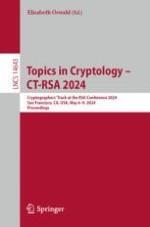2024 | OriginalPaper | Buchkapitel
Interactive Oracle Arguments in the QROM and Applications to Succinct Verification of Quantum Computation
verfasst von : Islam Faisal
Erschienen in: Topics in Cryptology – CT-RSA 2024
Verlag: Springer Nature Switzerland
Aktivieren Sie unsere intelligente Suche, um passende Fachinhalte oder Patente zu finden.
Wählen Sie Textabschnitte aus um mit Künstlicher Intelligenz passenden Patente zu finden. powered by
Markieren Sie Textabschnitte, um KI-gestützt weitere passende Inhalte zu finden. powered by
